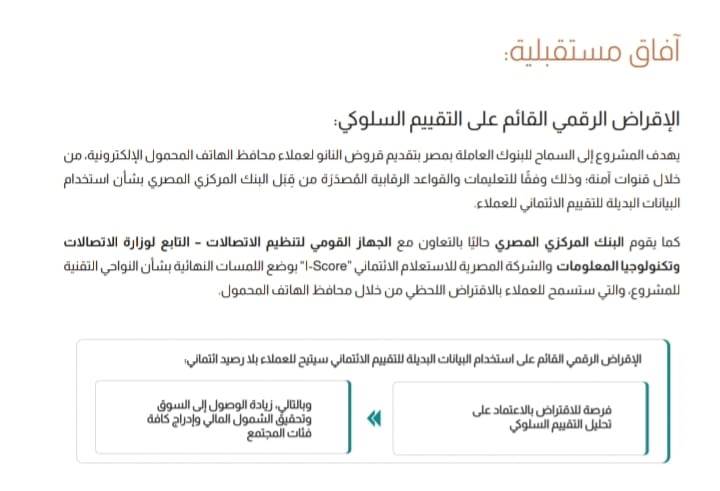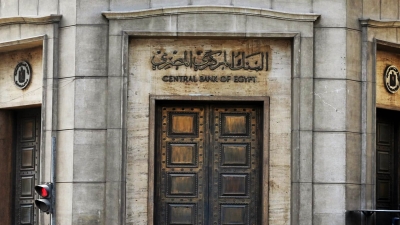CBE Unveils Major Initiatives to Boost Financial Technology: Digital Lending, Mobile Wallets, and More!
Wegdan Mohamed / Fatma Attia

A report from Financial Technology Outlook 2023, issued by Fintech Egypt initiative affiliated with the Central Bank of Egypt, revealed that CBE is currently working on issuing 4 new laws and regulations aimed at supporting and developing the field of financial technology in Egypt.
According to the report, the Central Bank is nearing completion of the Behavioral-Based Digital Lending Project. Additionally, they are set to introduce a new law to regulate alternative financing activities and financial technology activities related to banking services. Furthermore, CBE is in the process of finalizing the regulatory rules for providing cloud computing services, as well as issuing electronic authentication and approval rules and conditions.
The new measures that the Egyptian Central Bank is about to launch to support the financial technology ecosystem in Egypt are as follows:
1. Behavioral-Based Digital Lending Project:
The report issued by Fintech Egypt initiative confirms that CBE, in cooperation with the National Telecom Regulatory Authority under the Ministry of Communications and Information Technology, and the Egyptian Credit Bureau I-Score, is finalizing the technical aspects of the project. This will enable customers to access instant loans through their mobile phone wallets.
The project aims to allow operating banks in Egypt to provide nano-loans to customers through secure channels, following the instructions and regulatory rules issued by CBE regarding the use of alternative data for customer credit assessment.
The report highlights that the digital lending based on alternative credit assessment will provide an opportunity for customers without a credit history to access loans based on behavioral analysis, thus increasing market accessibility, achieving financial inclusion, and encompassing all segments of society.
2. Regulation of Alternative Financing and Financial Technology Activities Related to Banking Services:
The report further adds that CBE is currently working in collaboration with the General Authority for Financial Regulation to issue a new law that regulates alternative financing activities and financial technology activities related to banking services. The law aims to regulate activities such as P2P lending, P2P borrowing, digital ROSCA (rotating savings and credit association), and digital savings.
3. Issuance of Regulatory Rules for Cloud Computing Services:
The report confirms that CBE is currently preparing the final draft of the regulatory rules for providing cloud computing services. This move comes as a result of the rapid developments in technology and the increased reliance of the banking sector on technology and its contribution to achieving digital transformation.
4. Issuance of Electronic Authentication and Approval Rules and Conditions:
The Egyptian Central Bank is presently working on preparing the draft of the regulatory rules for electronic authentication and approval, which refers to a set of technological means used to verify the source of a message and to verify the identity of one of the subscribers when connecting to the system. It ensures that the identity verification message has not been altered or replaced during transmission. It serves as the digital equivalent of a signature.
As the Central Bank of Egypt takes these significant steps towards embracing financial technology, it aims to foster innovation, improve accessibility to financial services, and advance Egypt's financial sector into the digital era.
The Latest Measures Launched by the Central Bank to Support the Financial Technology Field in Egypt
1. Issuance of Regulatory Rules for Digital Banks:
CBE has issued regulatory rules for digital banks, including licensing and registration procedures for digital banks and their supervision and oversight. These rules represent a significant leap for the banking sector in Egypt.
The licensing requirements for digital banks state that the minimum issued and paid-up capital should not be less than EGP 2 billion when conducting all banking activities, excluding financing large corporations. However, financing these corporations is possible if the capital is increased to EGP 4 bn, and the largest shareholder is a financial corporate with prior experience in similar activities, representing at least 30% of the total capital value.
The licensing requirements also stipulate the submission of a detailed feasibility study, including defining the target segments and the planned products, as well as information technology plans and cybersecurity plans and strategies.
Digital banks are subject to the same regulations and controls applied to operating banks in Egypt, including laws and regulations related to combating money laundering and terrorism financing, in addition to other requirements that align with their nature of work.
2. Digitization of International Transfers for Mobile Wallets:
Regarding the digitization of international transfers for mobile wallets, the report highlights that CBE has allowed the use of mobile wallets to receive international transfers, following the regulatory rules for mobile payments. This has facilitated the receipt of these transfers.
Moreover, CBE has granted the necessary licenses to banks operating in Egypt that provide mobile wallet services, as well as licenses to mobile network companies to offer these services in collaboration with licensed banks and the National Telecom Regulatory Authority.
3. Launch of the Project for Digitizing Remittances of Overseas Workers in Coordination with Certain Banks... with 80% of Women Beneficiaries from This Project:
The report indicates that the Central Bank of Egypt has launched a project to digitize remittances of overseas workers, aiming to provide banking products to remittance beneficiaries to enhance digital transformation and integrate women into the formal financial sector.
It is noteworthy that women represent 80% of the beneficiaries, and this project is being implemented in coordination with several banks operating in Egypt, targeting the governorates with the highest influx of international remittances. Incentives are provided to encourage beneficiaries to use banking products such as prepaid card accounts and e-wallets.
4. Conversion of 3 Million Land Ownership Cards into Prepaid Bank Cards:
The report also states that CBE has converted 3 million agricultural land ownership cards into dual-application prepaid bank cards under the umbrella of the national payment network "Meeza." This conversion was carried out in coordination with Agricultural Bank of Egypt, in collaboration with Banque Misr and E-Finance.
Regarding the inclusion of financial technology companies in the programs offered to them in 2022, the report confirms that the participation rate of women in founding startups operating in the financial technology sector reached 14%.
This percentage is lower than the overall percentage of women's participation in founding startups in all other sectors, which reached 35% among the completed programs.
The report indicates that the startups operating in the financial technology sector that completed the programs in 2022 accounted for 28% of the total number of Egyptian startups within the portfolio.
Furthermore, the percentage of Egyptian companies operating in the financial technology sector that completed the programs in 2022 and had women as co-founders reached approximately 14% of the total number of Egyptian financial technology startups within the portfolio.


_20230719152927.jpg)
_20230719152927.jpg)













